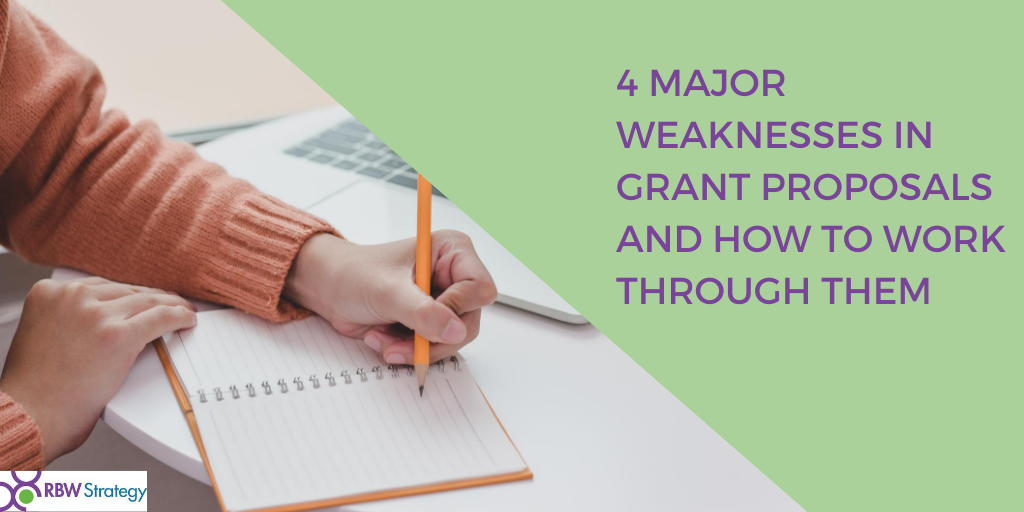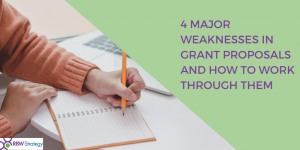4 Major Weaknesses in Grant Proposals and How to Work Through Them

Writing a grant proposal takes a lot of leg work, and nobody gets it 100% right the first time. If you’re looking to improve your grant writing skills, it’s important to do some reflecting on prior proposals, and understand where you can improve. In this article, we’ll be going over some of the most common grant proposal weaknesses, so you’ll have the tools necessary to make your next proposal the best it can be.
Weakness #1: Using too many hyperboles.
Hyperboles are exaggerated statements or claims that are not meant to be taken literally. We have a tendency to include these without realizing it because naturally, you want to “show off” your organization and highlight all the wonderful things about it. But make sure you’re being factual, and not overselling. Don’t include any unnecessary fluff, or make claims about your organization that can’t be backed up 100%. Keep in mind, there’s also a fine line between confidence and arrogance. You can speak highly of your organization without boasting! Reviewers have a heightened sense for scoping out these ego trips, so make sure you remain confident, but humble. In addition, we also recommend using language that suggests real action, versus a thought. So for example, use words like “expect” and “anticipate” vs. words like “hope.” These words are more action driven and show that you’re not all talk.
Weakness #2: Poor organization.
These are arguably the biggest grant proposal weaknesses today. Remember, you’re supposed to be telling a story. And if you’re jumping all over the place, it’s harder to convey your message. If your story isn’t presented in a logical order, the reviewer is likely to lose interest or misinterpret your goal. We recommend using numbers, letters, and/or bolded headlines to create structure in your proposal. Be clear in your writing, and think about it as if you were reading it from the reviewer’s lens. There’s a good chance the bulk of the proposal will be scanned, so really drive in the main points as concise as you can. Be sure to start off with your hypothesis, go into the specific aims and goals, and close with a conclusion. We also recommend sharing the proposal with an honest friend. Reviewers aren’t going to spare your feelings, and it might be better to hear any constructive feedback from a friend first.
Weakness #3: Failure to prove significance and innovation.
One of the toughest parts about grant writing is finding a way to stand out. It’s possible to write a great grant proposal without providing any real uniqueness; and we see it often. Make sure you’re honing in on the “why.” Why is this problem particularly important? How does the grantor fit into your overall efforts and what part do they play in shaping the future of this problem? In addition to not proving a problem’s significance in grant proposals, we often see a failure to communicate any real innovation. What are you doing to make this project original? What makes your efforts special and what unique ways are you approaching the situation? In a nutshell — stand out!
Weakness #4: Language and grammatical errors.
There is no excuse for turning in a proposal with spelling and grammatical errors! You should have at least two other people proofread before submitting it. If you want to go the extra mile, consider hiring a freelance proofreader. It’ll give you peace of mind knowing you’re letting someone handle this who does it for a living! In addition to spelling/formatting errors, make sure you’re focusing on your language. If you fail to use the correct industry terminology, your credibility will decrease drastically and quite frankly, you’ll look ignorant. If you’re unsure on terminology, try reaching out to an industry professional for a second look.
If you need assistance with your grant proposal weaknesses, RBW Strategy has you covered! We create a work plan to ensure alignment with funding opportunity guidelines. Our team is also skilled at integrating program-specific language, graphics, literature reviews, and research to create a detailed statement of need that effectively demonstrates your organization’s request for funds. Contact us online today!

